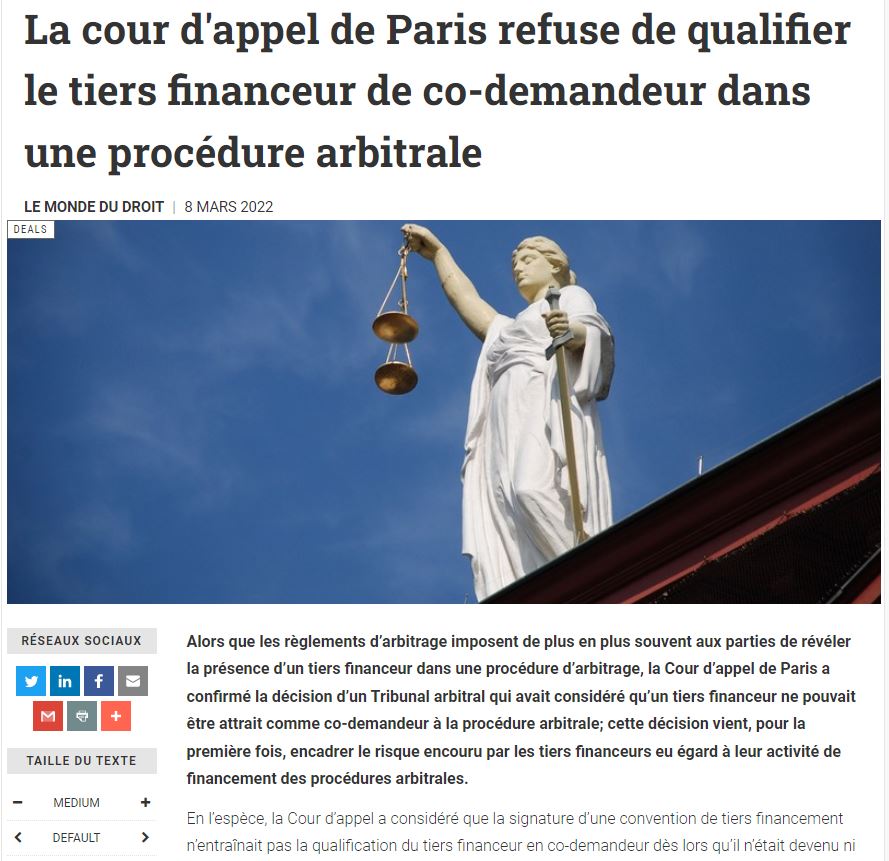As arbitration rules increasingly require parties to disclose the involvement of a third-party funder in arbitration proceedings, this recent decision from the Court of Appeal may reassure third-party funders but also funded parties.
In the context of an action for annulment in which the respondents were represented by Caroline Duclercq and Hervé Cabeli, the Paris Court of Appeal, in a decision dated January 25, 2022, refused to consider the third party funder as a co-claimant in the arbitral proceedings.
As a preliminary remark, it should be noted that the Court, which, in these annulment proceedings, had to rule on whether or not the arbitral tribunal had jurisdiction based on Article 1520, 1° of the Code of Civil Procedure, clarified on this occasion the scope and limits of its review:
- The Court first reiterated the recital of the now famous Schooner decision according to which: "when jurisdiction has been discussed before the arbitrators, the parties are not deprived of the right to raise new pleas and arguments on this issue before the judge in charge of the annulment proceedings and to put forward new evidence to that effect".
- However, the Court then added that "[t]he setting aside judge shall review the decision of the arbitral tribunal as to its jurisdiction by seeking all the elements of law or of fact which make it possible to assess the scope of the arbitration agreement, without, however, reviewing the merits", so that "it is not for the court to take the place of the arbitrators, nor to assess the relevance of their reasoning in the assessment of their own jurisdiction, but to assess the scope of the arbitration agreement.”
As regards the jurisdiction of the arbitral tribunal over the third party funder, the Court first recalled that the assessment of the arbitration clause to rule on the jurisdiction of the arbitral tribunal "must be made in light of the will of the parties, without having to apply French law, in application of the substantive rule of the law of international arbitration according to which the arbitration clause is assessed, subject to the mandatory rules of French law and international public policy, according to the common will of the parties in view of all the circumstances of the case, without it being necessary to refer to a State law". The Court of Appeal then analyzed the terms of the articles of association which included the arbitration clause and in particular the definition of shareholder to determine whether or not the third funder can be considered as bound by the arbitration clause. It considered that, in this case, the third party funder was neither the owner nor the transferee of the company's shares when the third-party funding agreement was signed. The status of shareholder cannot therefore "be attributed to it in anticipation of a hypothetical transfer, but only 'subsequently', i.e. once the transfer has been completed". The Court of Appeal thus concluded that the arbitral tribunal had rightly declined its jurisdiction with respect to the third party funder which was - unduly - brought as a co-claimant in the arbitration proceedings.
Furthermore, the Court noted that "with regard to the interference of the [...] third party funder, to the point of having the arbitration clause extended to it, it is up to the appellants not only to establish the reality of this interference but also to prove that this interference is not inherent to its capacity as a third party funder which necessarily implies that it participates in the proceedings, as only exceptional circumstances could allow such an extension". The fact that the third party funder was officially declared in the arbitration, that it was interested in the outcome of the dispute in a form other than merely pecuniary (i.e., the transfer of shares in a competing company) and that it was an occasional third party funder does not constitute such an exceptional circumstance according to the Court. The Court also recalls that the third-party funder and the funded party have distinct interests.
In doing so, the Court restricts the possibility of involving third-party funders in proceedings involving the funded party.
Finally, from a procedural point of view, it is also worth noting that the international chamber, following the appellants' suggestion, decided to audition a law professor who had given an opinion on a specific point of law for one of the parties ; on this occasion, the Court of Appeal allowed the parties to ask their questions directly to the professor at the hearing. Thus, the Court decided to adopt a rather flexible approach in the context of proceedings under the protocol (knowing that article 5. 4.4 of the protocol provides that "[t]he witnesses may then be invited by the judge to answer the questions that the parties wish to ask"), rather than sticking to a strict reading of article 214 of the Code of Civil Procedure which states that the parties may not ask questions to the witnesses directly.
